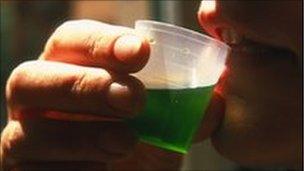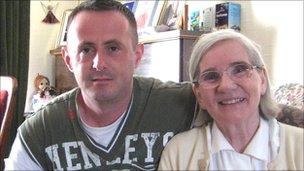Why quitting heroin substitute methadone is 'vital'
- Published

The use of methadone has been controversial in recent years
The heroin substitute methadone can be used as a way of weaning addicts off heroin but the substitute can also become addictive.
Earlier this year a debate broke out in Scotland when Professor Neil McKeganey, director of the Centre for Drug Misuse Research at the University of Glasgow, said more effort was needed to get people off drugs, including methadone, through abstinence.
But a group of 40 specialists, including university professors and doctors who treat addicts, responded: "If policy makers were to heed the critics' advice to close down methadone treatment or impose an arbitrary time limit on its administration, the community can anticipate more overdose deaths, more HIV and more crime."
So what do recovering addicts think? Chris used methadone for five years to help wean him off heroin but felt he had to quit the drug substitute last October
"I just thought, I've got to get a grip here, because I've been in and out of prison since I was 16 - that's half my life," he told The Report.
'Wake-up call'
Chris, an inmate of HMP Edinburgh, lives in Ratho Hall, a specialist Addiction Support Area that helps prisoners achieve abstinence.
"I heard about Ratho Hall, and it's given me the wake-up call that I needed," he said.
Chris was prescribed methadone, a synthetic opiate that is taken orally, to wean him off his heroin addiction but although methadone can help addicts stabilise their lives, it is also addictive.
Ratho Hall is the only facility of its kind in Scotland. It opened last year in brand new accommodation.
Of the 30 inmates resident last week, 11 have become completely drug-free.
'Quitting methadone'
The Scottish government produced its strategy document on drugs, The Road to Recovery, in 2008.
In this, the Community Safety Minister, Fergus Ewing of the SNP, explained how he wants to see "a new vision" for Scotland "where all drug treatment and rehabilitation services are based on the principle of recovery."
This is a shift away from an acceptance that people will stay on methadone for lengthy periods of time unchallenged.
Chris, who started to use heroin when he was 18, talked of his own addiction: "When you're on heroin or methadone your head's hazy. I realised when I was on methadone that I was just putting my life on hold.
"Now I feel that abstinence is a walk in the park compared to taking drugs. When you're abstinent you can just be yourself - it's a weight off your shoulders."
Chris said he could not have done it on his own. In Ratho Hall, there are drug counsellors, regular peer-support meetings and medical staff.
Paul Davidson, unit manager of Ratho Hall, explained how the unit works.
"If guys come in here on a methadone prescription, they have to have a reduction plan.
"So they'll be reduced at a rate they feel comfortable with and the doctor feels is right for them."
Around one in five prisoners in Scotland is being prescribed methadone.
But across the whole of Scotland it is estimated that 22,000 people are taking methadone.

Maxie Richards (right) offers counselling to addicts like James
Some of them may have been on it for decades. In England more than 150,000 people are receiving a substitute drug treatment for their addiction, normally methadone.
Maxie Richards, a committed Christian has been helping addicts get clean since 1986, and is a firm believer in abstinence.
Her suburban Glasgow home is an unlikely venue for drug rehabilitation.
"The majority of those I see now want to come off methadone. And it's harder to come off than heroin, it's so sad.
"It's also a very debilitating drug too, and can lead to memory loss," she explained.
James Boyd, one of the addicts who came to Maxie Richards for help, looks fit and well, but when he arrived on her doorstep in June, he was three stone lighter.
"I thought death would be better than the way I was feeling. What methadone does to you is wrecks you physically, mentally and spiritually.
"I said to myself, I can't do this any more. Every single person I know is on heroin and they are all on methadone too."
James stopped methadone and all other drugs nearly two months ago. He thinks he has got over the withdrawal symptoms now.
"It's just two weeks ago that I had my first full night's sleep."
Another former addict - Gail - is looking forward to a drug-free life.
She is slowly reducing her methadone dose with the support of her doctor. Gail has been taking methadone for eight years.
'Staying clean'
"A lot of addicts use methadone as a backup plan - so when you can't get hold of any drugs, you've got something to hold you.
"I was taking heroin on top of my methadone. Then I took half of it and used to sell the rest, which I know is wrong."
Eighteen months ago, Gail started to take methadone as it was prescribed.
"When I stopped injecting and started to take my full prescription, that's when I started to feel the benefit of methadone.
"I could get up in the morning, do the housework, and attend the appointments I'd made.
For the first time in many years, Gail is planning for her future with the help of the charity Centrepoint in Edinburgh.
She wants to go into a drug rehabilitation centre to make sure she overcomes her addiction once and for all. Then she aims to find a job.
And it is her methadone prescription that is keeping her away from heroin.
- Published8 July 2010